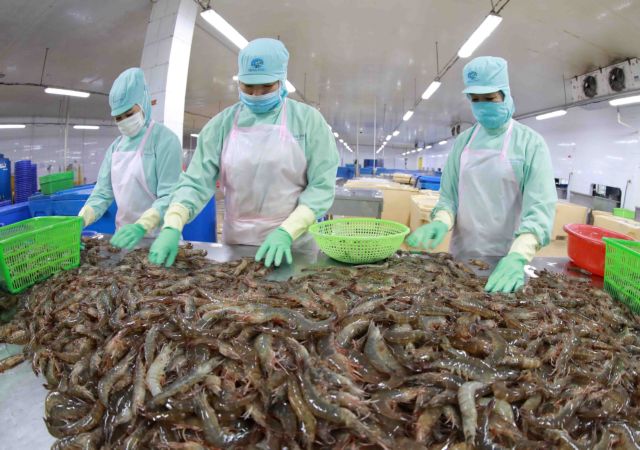According to the Vietnam Association of Seafood Exporters and Producers (VASEP), in the first six months of this year, the shrimp export value reached about US$1.6 billion, up six per cent year on year.

Processing shrimp for export. In the first six months of this year, Vietnam's shrimp export value reached about US$1.6 billion, up 6 per cent year on year. — VNA/VNS Photo
Vietnam's shrimp exports grew in the first half of this year, but the market is facing competition from other countries in the world.
According to the Vietnam Association of Seafood Exporters and Producers (VASEP), in the first six months of this year, the shrimp export value reached about US$1.6 billion, up six per cent year on year.
In June alone, this value reached $344 million, an increase of five per cent on year.
During the first half, mainland China and Hong Kong, the largest export market of Vietnamese shrimp, showed a recovery in shrimp exports in June, after decreasing in May.
In the first half of the year, the shrimp exports to this market reached $328 million, 17 per cent higher than the same period last year.
By the end of the year, Vietnam's shrimp exports to this market will be under pressure on price, especially for black tiger shrimp and white-leg shrimp. Vietnamese shrimp competition from markets such as Ecuador, India and Indonesia that will be promoting shrimp export to China due to high tariffs imposed by the US.
The second largest market for Vietnamese shrimp was the US. In the first half of the year, shrimp exports to this market grew one per cent year-on-year to $303 million. After decreasing in May, exports to the US recovered in June.
But shipping costs have increased dramatically, up by 40 per cent from May due to conflict in the Middle East.
In the US market too, Vietnamese shrimp has strong price competition from shrimp from Ecuador, India and Indonesia.
VASEP expects that the US's demand for Vietnamese shrimp may increase slightly in the third quarter of this year when importers increase purchasing for year-end festivals.
Meanwhile, Vietnam saw a slight reduction of three per cent and ten per cent to $229 million in Japan and $149 million in South Korea, respectively.
In Japan, Vietnam's value-added goods still maintain a better competitive advantage compared to other suppliers such as India and Ecuador.
According to VASEP, the import demand of these two markets is expected to increase slightly from September to meet the year-end demand.
For the EU market, after a slow first quarter, the shrimp exports to increased solidly in the second quarter.
In the first six months, exports to EU reached $217 million, an increase of 13 per cent on year. In June, this value stood at $52 million, up by 31 per cent.
The EU market's demand for shrimp imports is expected to continue to increase in the second half.
However, VASEP said that besides facing price competition with Ecuadorian and Indian shrimp in the US and EU, Vietnamese shrimp face an additional problem: disease outbreaks in farmed shrimp, potentially causing a shortage of raw materials for processing.
Companies may be forced to reduce shrimp exports to the US although this market has a large consumption power. Meanwhile, they will focus on nearer markets such as Japan, South Korea, Australia and China.
In the second half of the year, it is expected that the main import markets of Vietnamese shrimp will have better markers, such as lower inventory, easing of transportation difficulties and recovery in demand and prices.
If all expectations follow a positive scenario, Việt Nam could achieve a shrimp export value of $4 billion in 2024, VASEP said. — VNS
Read original article here